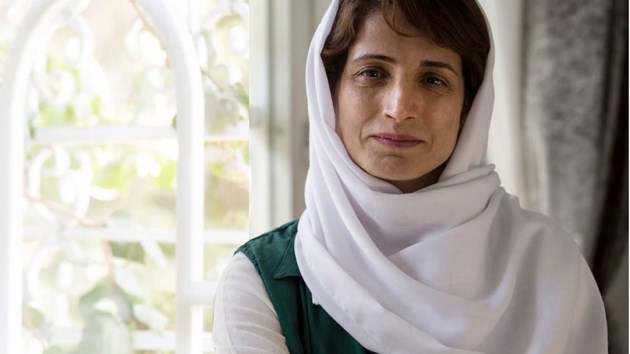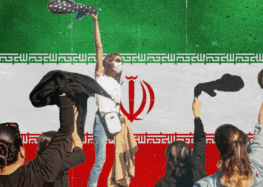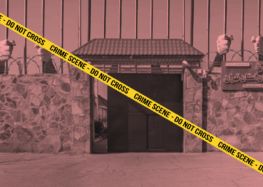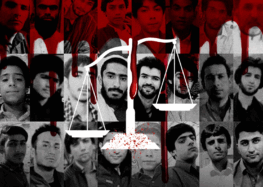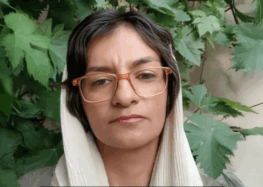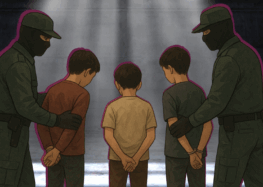Sotoudeh Stages Sit-in to Protest Ban on Her Legal Practice
Human rights lawyer Nasrin Sotoudeh began a sit-in on October 21, 2014, at the Iranian Bar Association in Tehran to protest a ruling that puts a three-year ban on her legal practice, and in protest against the general state of legal representation in Iran. One day before starting the sit-in, in an interview with the International Campaign for Human Rights in Iran, she said that the protest will be of unlimited duration, until the Iranian Bar Association takes action on her demands.
On October 18, 2014, Branch Two of the Lawyers’ Disciplinary Court at the Iranian Bar Association banned Nasrin Sotoudeh from her legal practice for three years. In an interview with ISNA, Sotoudeh said, “The Head and the Deputy Head of the Iranian Bar Association repeatedly told me that they are under pressure [to revoke] my lawyer’s license. They went as far as suggesting that I turn in my license voluntarily, which I refused.”
Sotoudeh told the Campaign that she has raised four demands to the Iranian Bar Association. “My first demand will be to remove the Bill of Comprehensive Law of Attorneyship from the agenda at the Iranian Parliament. My second demand is a review of the forced unemployment of dissidents. My third demand is an immediate review of the state of legal representation in Iran, and my fourth demand is the removal of the ban on my legal practice,” she told the Campaign.
“The Iranian Bar Association did not even hear my and my lawyer’s defense before issuing its decision. This is totally illegal,” added Nasrin Sotoudeh.
Regarding her third demand which pertains to improving the state of legal representation in Iran, Sotoudeh told the Campaign that, “Previously, they used to tell families of suspects not to hire certain human rights lawyers, ‘because we are sensitive about that lawyer.’ Many human rights lawyers either left Iran after experiencing these restrictions, or they ended up in prison. But now things have deteriorated to the point where they are assigning lawyers for suspects without their knowledge. There have been cases where a suspect was transferred to court from prison and someone was introduced as his or her lawyer at the court, without the suspect or his/her family’s knowledge, or [regardless of] whether the individual introduced as the ‘lawyer’ even holds a legal practice license.”
“I begin my demands and objections at what I consider to be my home, the Bar Association. The Bar Association has to be accountable to the three-year ban on my legal practice and other issues. So many lawyers went to prison or were prosecuted; what defense did the Bar Association put up for them? I begin from my own home,” Sotoudeh told the Campaign.
The Iranian Bar Association had previously rejected the request by the Tehran Prosecutor’s Office for suspension of Sotoudeh’s legal practice permit. Acting as plaintiffs in a case against Sotoudeh, the Deputy Tehran Prosecutor and Head of the Evin Prison Courts asked the Iranian Bar Association to revoke Sotoudeh’s legal practice permit. The first session of the trial was held at Branch One of the Bar Association on February 23, 2014. The second session was held on August 24, 2014, and the Bar Association announced on August 30, that the Lawyers’ Disciplinary Court had overruled the ban on Sotoudeh’s legal practice. But the plaintiffs requested a new review, which has resulted in the new three-year ban on Sotoudeh’s legal practice.
Nasrin Sotoudeh was arrested in September 2010 and subsequently sentenced to 11 years in prison, later reduced on appeal to six years, and a ten-year ban on her legal practice, on charges of “acting against national security, collusion and propaganda against the regime, and membership in the Defenders of Human Rights Center.” Her prosecution followed her work defending victims of human rights violations in Iran, and she spent three years in prison, at times in solitary confinement, until her release in September 2013 . Sotoudeh was awarded the Sakharov Prize in 2012 by the European Union’s Parliament for her defense of human rights. The authorities in Iran have engaged in the systematic persecution of human rights defenders in the country, and a number of prominent human rights lawyers, including Abdolfattah Soltani and Mohammad Seifzadeh, remain in prison.

